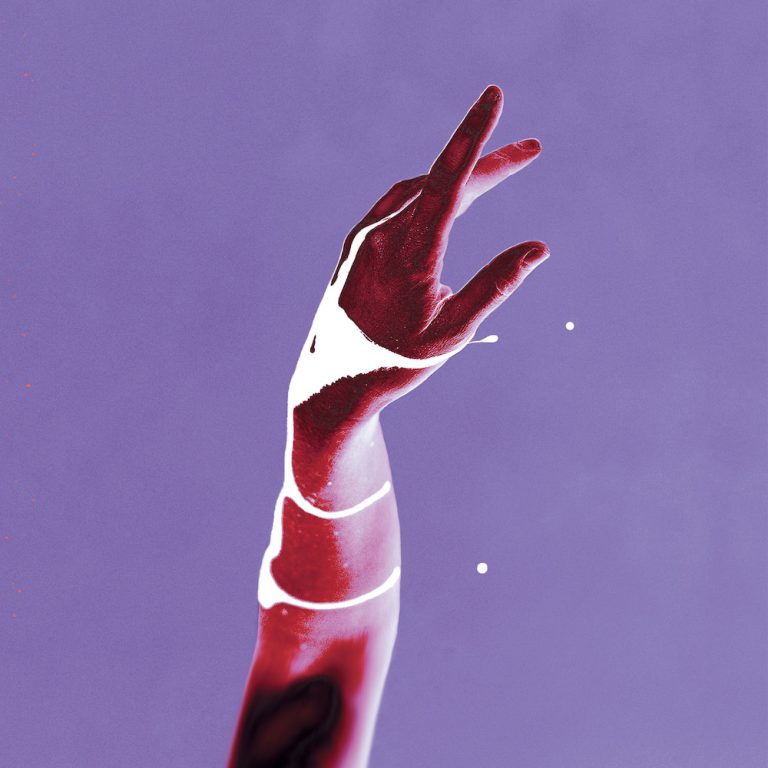Sour Cherry Bell, the second album from Melissa Guion’s hard to define soundscape-shoegaze-goth-artrock project MJ Guider, is a glacial wonder of cold tones and eerie atmospherics. A significant artistic leap forward from 2016’s Precious Systems, the album swirls in dizzying eddies of sound that reverberate in intoxicating fashion. It’s a record of exquisite rapture and repetition, of splendour in manifold layers.
“Lowlight” kicks things off and is a too-short blurry piece of noise that floats prominently in focus, wistful and eerie. It’s an enchanting opener, but frustrating in its length as it feels like an hour of its beauty would not even be enough. At times, the directionless nature of the songs conjured up by Guion feel like the perfect accompaniment to the current state of the world where misinformation obscures the truth that, in turn, is too hard to take. Second track “The Steelyard” is a perfect example, as it uses a direct, almost industrial beat over ghostly instrumentation, like the echoes of a dying civilisation being played out to soundtrack the end of capitalism, evading our focus yet penetrating our core.
The pulsing sound of incessant machinery is a thread that runs through the album, with “FM Secure” leaning on the metronomic mundanity of Kraftwerk at their most alienated. The hazy tones of the record give an edgeless feel to the record as a whole, as though it doesn’t belong in a corporeal sense, but in a skewed cognitive assonance. “Body Optics” uses a pulsating beat over a melange of ethereal noises, the heartbeat being a prominent aspect of the spirit. The dream-weaving tapestry of the song hangs in suspension, a curiosity to unpick rather than a superficial thing of mere aesthetic splendour.
The essence of Sour Cherry Bell is disconnection – the free-floating vocals meander over the music rather than embed themselves within it, and the distant feel of the mix positions the listener as a far-off observer to the beauty and wonder, rather than an active agent within its telling. The sounds envelope, smother and cloak the listener, yet also act as an obstacle to a true understanding of the intentions of the texts. There is rapture within, yet it comes at the price of incomplete comprehension.
Throughout Sour Cherry Bell there is an aesthetic of disquiet beneath the serene shoegaze ambience, a haunting emptiness that is only further enhanced by the all encompassing walls of noise which don’t obscure the fragility at the core of the tracks. The songs sound like echoes rather than imprints, obfuscated memories as opposed to lucid dreams. A case in point is “Quiet Time”, which features endlessly repeated vocals, before shamanic chanting enters the fray – yet it is so buried in the mix that it feels like the shockwaves of a trauma long past rather than offering a degree of visceral urgency.
The title of the album closer “Petrechoria” likely relates to petrechor, the earthy smell produced with new rainfall, which links to the spirit of sensation rather than experience, which is a key aspect of Sour Cherry Bell. The haunted nature of the album lends itself to a focus on the physical, the dirt rather than the diaphanous, as the work comes to an end. Signs of rebirth, of new life and potential for growth spring to mind in this reverb-infused eulogy. It’s a delicate ending, with space between the notes being evident for the first time on the record; a contemplative spectre.
MJ Guider leans on the fuzz-drenched dreampop of Belong’s criminally overlooked Common Era and the icy vocal detachment of Siouxsie Sioux, with more than a smattering of Miss Kittin and Grouper thrown in for good measure. Sour Cherry Bell is an album that has these clear influences, yet morphs itself into aural palettes that transcend such comparisons. A rich body of work, the lush layers of sound presented make for a rewarding experience again and again.

